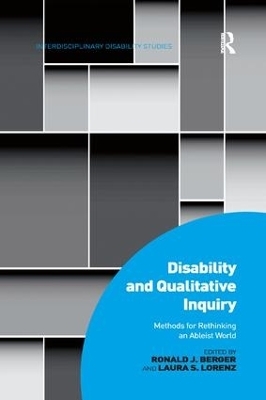
Disability and Qualitative Inquiry
Routledge (Verlag)
978-0-8153-9212-5 (ISBN)
Ronald J. Berger is Professor Emeritus of Sociology at the University of Wisconsin-Whitewater. He has published more than 50 journal articles and book chapters, as well as 16 books, including Introducing Disability Studies; Hoop Dreams on Wheels: Disability and the Dedicated Wheelchair Athlete; Wheelchair Warrior: Gangs, Disability, and Basketball (with Melvin Juette); Disability, Augmentative Communication, and the American Dream: A Qualitative Inquiry (with Jon Feucht and Jennifer Flad); and Storytelling Sociology: Narrative as Social Inquiry (with Richard Quinney). Berger has received his university’s highest awards for both teaching and research, as well as the Wisconsin Sociological Association’s William H. Sewell Outstanding Scholarship Award. Laura S. Lorenz is a senior research associate and lecturer at the Institute for Behavioral Health of the Schneider Institutes for Health Policy at Brandeis University, USA. She is Program Director for the Supportive Living Inc Wellness Center for Brain Injury Rehabilitation and Research in Lexington, MA working with inter-disciplinary colleagues to implement a program of research to support the social, cognitive, and physical rehabilitation of individuals living with chronic brain injury. Before coming to Brandeis, Dr. Lorenz worked for more than 20 years in international development as a writer, editor, and educator, focused on identifying and disseminating research, management improvement, and program results for global audiences, for agencies such as UNICEF, World Food Program, and the US Agency for International Development. Her assignments often involved encouraging partnerships, project replication, and behavior change. She has published in peer review journals in the fields of sociology, health, and visual studies.
Preface, Ronald J. Berger and Laura S. Lorenz; Disability and qualitative research, Ronald J. Berger and Laura S. Lorenz. Part 1 Observational Methods: A bricolage of urban sidewalks: observing locations of inequality, Valerie Leiter; Observations of a disability summer camp: the method of phenomenological seeing, Ronald J. Berger; Ethnographies of blindness: the method of sensory knowledge, Gili Hammer. Part 2 Interviews and Focus Groups: Staying true to their stories: interviews with parents of children with disabilities, Sara E. Green; Negotiating deafness and identity: methodological implications of interviewing with hearing loss, Melissa Jane Welch; Talking about sex: focus group research with people with disabilities, Sarah Smith Rainey. Part 3 Autoethnography and Life History Methods: Institutional resistance to accessible architecture and design: a collaborative autoethnography, Carla Corroto and Lucinda Kaukas Havenhand; ‘It’s not like you’re going to college anyway’: a performative autoethnography, Anjali J. Forber-Pratt; Recovery from spinal cord injury: a theorized life history, Ronald J. Berger. Part 4 Content Analysis and Visual Methods: Disability and humor in film and television: a content analysis, Ronald J. Berger; Living with brain injury: participatory visual methods and narrative analysis, Laura S. Lorenz; Sharing the results of visual methods research: participation, voice, and empowerment, Laura S. Lorenz and Maria Paiewonsky. References; Index.
| Erscheinungsdatum | 04.12.2017 |
|---|---|
| Reihe/Serie | Interdisciplinary Disability Studies |
| Verlagsort | New York |
| Sprache | englisch |
| Maße | 156 x 234 mm |
| Gewicht | 380 g |
| Themenwelt | Sachbuch/Ratgeber ► Gesundheit / Leben / Psychologie |
| Sozialwissenschaften ► Pädagogik ► Sozialpädagogik | |
| Sozialwissenschaften ► Soziologie ► Empirische Sozialforschung | |
| ISBN-10 | 0-8153-9212-5 / 0815392125 |
| ISBN-13 | 978-0-8153-9212-5 / 9780815392125 |
| Zustand | Neuware |
| Haben Sie eine Frage zum Produkt? |
aus dem Bereich


